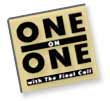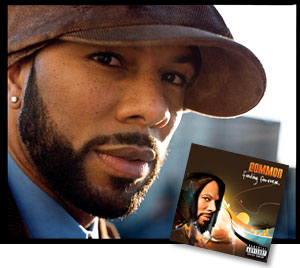FCNNEWSSOURCE
Common Music (Official Site)

Hip hop, rap artist, Common, debuted on the scene in 1992 with his first album titled, “Can I Borrow a Dollar,” followed by “Resurrection,” “One Day It’ll All Make Sense,” “Like Water for Chocolate,” “Electric Circus,” “Be,” and soon to be released, “Finding Forever.” The Chicago born and raised artist can also add “actor” to his well-known, reputable career as a rap artist and author of two children’s books, “I Like You, but I Love Me” and “The Mirror and Me.” He is due to complete his third children’s book by the end of the year.
On behalf of The Final Call, Patrice Muhammad interviewed Common, the day after his performance at the Harmony Festival in Santa Rosa, California on June 10, 2007.
Final Call (FC): You’re labeled (and that’s well documented) as a conscious rap artist. When did your sense of consciousness begin? In other words, when did you come into the knowledge of your true self?

Common (C): Well, I think the foundation was being laid when my mother would take me to church, that was the beginning, just discovering and learning more about God as a child. Then, hip hop started educating me and bringing more understanding about God because hip hop was exposing me to Islam and the Five Percent Nation, different beliefs that resonated with me and it felt very truthful to me as much as I learned from Christianity, too.
When I was in high school, I was getting introduced to that through hip hop. I think the true knowledge of self, and me really growing into my own and developing into my own understanding of God, and really going out to seek on my own when I was around 21; listening to John Coltrane and reading the Last Poets and going to hear the Minister [Farrakhan] speak, and going to church and just different things and reading books of Buddhism, and coming into my own understanding that God existed in so many things.
FC: You are known for lyrics which speak to the injustices of people, especially Black people dealing with the harsh realities and struggles of the poor and disenfranchised hanging on the “corner,” but also the faithfulness of relationships between man and God, and between woman and man. What do you believe is God’s purpose for you as it relates to what you describe in your music?
C: I believe that the purpose is to speak the word of God, to spread God’s light through song, through activism, through art. I believe that my purpose is also to just enlighten and inspire from a level of spirituality and social awareness. I also believe that I’m there to encourage, to be a reflection of God and express that in the music, to lead people towards God. That’s what I believe I’m here for.
FC: What sparked your interest to become an actor, and have you considered at all that it might serve as a mere distraction to the purpose that produced Common in the first place?
C: I really felt that when I started acting, I took classes and I really enjoyed it so much I felt it was like something was making me more in tune with myself and allowing me to express myself in other ways. So, I felt it’s definitely helpful just to my soul, you know, to be honest and just as a actor, I ain’t even talking about going to do movies, I’m just talking about going through the process of acting, just digging some of the inner work that you gotta do as a actor. You know, it makes you dig into yourself more, so I found that to happen, and when that happened, I was just more inspired to be an actor and go out there and expand my career. I definitely feel it’s a benefit towards the activism that I’m doing because not only is it providing me a platform to become a more well-known figure, but it’s also gonna provide more economics and more connections for me to go out and do things that are gonna mean something. One thing I realize is, you know, with notoriety and success, just economics, too, come a certain amount of influence and when you got that influence, you’re able to influence more and more people. You just gotta do the right thing when you get that platform, you get that spot light because that’s what I think it’s about; because, I never felt that I just wanted my message to be heard only by the underground hip hop audience. That’s the beginning. That’s where I come from and I want them to hear it too. But, I want those that don’t even know about hip hop to hear it, those that ain’t even interested in it to hear it. I want those that feel like hip hop is only about negative stuff to hear, so then they could know something different and make change too, you know. Like in the Bible, it say it’s the sick that need the physician, it’s the sick that need the healing, so sometime we gotta go get that message out to everybody. That’s what the goal is for me.
FC: It’s been said, and that leads right into this next question, that the entertainment industry, especially “Hollywood” can be very unscrupulous and just down right cut throat. What is most influential in your life that keeps you rooted enough not to fall victim to Hollywood’s treacherous clutches?
C: Well, I would say that the Most High God, just staying in tune with God, that’s my foundation and that’s throughout everything, through the perils of the music industry, through the street, dealing with some of the street stuff that you have to deal with, whether you have achieved a certain amount of success or not, you still have to deal with some of the street elements. Just dealing with life regardless of how popular you are or whatever, you still have family members and deaths and marriages and births, and all these different things that go on, divorces and problems just like every other human being, and God is the foundation that sees me through, that carries me through. I just continue to strive to communicate with God.
FC: Absolutely. Minister Farrakhan was instrumental in helping to quell the feud between you and Ice Cube in 1994. What did you learn from that counsel with the Minister that continues even today in your career as you develop?
C: There’s gonna be many things that come along that will try to separate us, you know, it’s the Willie Lynch letter. The Willie Lynch Letter is real active right now, that whole mentality, but we can’t allow them to separate us, that’s what I learned. He said something important, too, he was like, “Man, I ain’t expecting you to be squeaky clean, try to straighten up certain things about your raps.” You see that happening now, what he was saying back then. Now, everybody is asking for the raps to be straightened up. When the Minister said it you can tell it was coming from a place of love, so that’s what’s important.
FC: You are preparing, and this is the final question, to release your seventh LP, titled, “Finding Forever,” on July 31. Can you describe the thoughts you were experiencing during the development of this project?
C: I was enthused. I‘ve been enthused, and I’ve been like man this is my seventh album. This is a big blessing and I have actually been feeling free making the album because I hadn’t been really. I’d been doing other things, which allowed me not to be so–all the pressure on the music. It’s great to be able to do it, I just went out there and my thoughts musically were just like make something that’s creative, that’s raw, that’s pure, you know.
FC: Thank you for taking time out of your hectic schedule for this interview because as you know The Final Call newspaper is always willing to promote positive influences for our people, to help and look to for guidance and direction. So, continue to give us something to write about you in that light, and may Allah continue to bless you with the determination and the will to seek and to help save our people who die from the lack of knowledge.
C: Yes.
FC: Thank you.
(Patrice Muhammad, PA-C, is the Central Region Minister of Health & Human Services for the Nation of Islam. She currently works in the Emergency Room at Methodist Hospital in Indiana and also provides herbal and nutritional consultation. All correspondence for Ms. Muhammad may be directed to: [email protected].)












